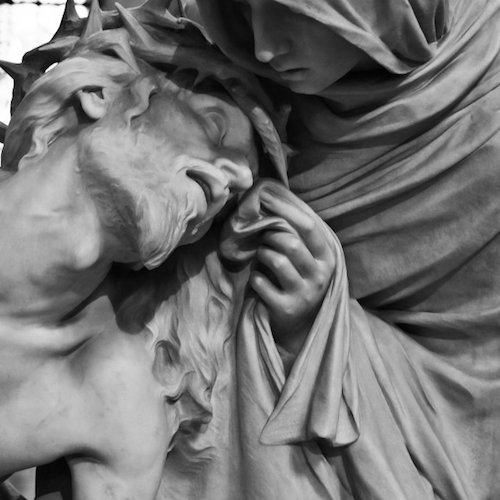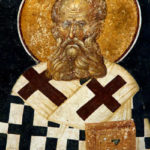We run our website the way we wished the whole internet worked: we provide high quality original content with no ads. We are funded solely by your direct support. Please consider supporting this project.

A Foolish and Weak-Looking God
The New Testament assumes that the God of Israel and the God revealed in Jesus Christ are one and the same God. But there also can be no question that the portrait of God that was unveiled when the Messiah arrived on the scene was in some respects quite different from what the OT had prepared most Jews to expect. N.T. Wright captures the unprecedented impact Jesus made when he notes that, since his coming, the very meaning of the word “God” has to be “again and again rethought around the actual history of Jesus himself” (Jesus and the Victory of God, 661). The new insights that Jesus reveals about the character of the God of Israel is nothing short of shocking.
Undoubtedly the most astounding new dimension of the God of Israel that Jesus unveils concerns the “foolishness” and “weakness” of his voluntary death on the cross on behalf of his enemies (1 Cor. 1:23). Paul’s attribution of “folly” and “weakness” to God constituted a new language of God. Even more it is a new understanding of who God is. The way in which Paul and his communities placed the cross at the center of their understanding of what Jesus revealed about God constituted a transformation in their conception of God. One theologian argues that the revelation of God in the crucified Christ “stands God on the head” (D. Georgi, Theocracy in Paul’s Praxis and Theology, 54). And it is for this reason that we must rethink the very meaning of the word “God” in light of Jesus.
The writer of Hebrews put it this way, “In the past God spoke to our ancestors through the prophets at many times and in various ways, but in these last days he has spoken to us by his Son, whom he appointed heir of all things, and through whom also he made the universe. The Son is the radiance of God’s glory and the exact representation of his being, sustaining all things by his powerful word” (Heb 1:1-3).
In contrast to all previous spoken and written revelations, Jesus is God’s own Son. As is the case throughout the NT, the import of referring to the “Son of God” is not to suggest that Jesus is only a Son and not God himself, but to suggest that he is the very embodiment of God. While God revealed himself in a diversity of ways in the past, only in Christ has God come in person. Torrance wonderfully captures the radically new thing that took place in Christ when he says,
In Christ, what God communicates to man is not something, but his very self. This is distinct from all other acts of God. This is God’s unique act, his reality-in-the-act, and apart from this act there is no God at all….in Jesus Christ God acts in such a way that he is himself in his act, and what he acts he is, and what he is he acts….Jesus Christ as act of God in humanity is identical with God’s own person (T.F. Torrance, Incarnation, 107-8).
Because the weak-looking Jesus who was crucified is identical with God’s own purpose, he is the one who alone is the radiance (apaugasma) of God’s glory (doxa) as well as the one and only exact representation (charactēr) of God’s very essence (hypostasis). Whatever value previous revelations have, they fall short of this. They may to some degree reflect God’s glory, but the crucified Son alone reflects the full brilliance of his glory. They may to some extent represent God, but the Son alone is the exact reflection of God’s character. And they may reflect aspects of God’s being, but the Son alone reveals God’s very essence.
What is more, the crucified Jesus is the one through whom all things came into being and the one for whom everything exists, a view expressed elsewhere in the NT (Jn 1:2; Col. 1:15-17). This means that Jesus is not only the one perfect expression of God’s essence; he’s also the perfect expression of God’s purpose for creation. God is working in and through everything that exists and every event of history to eventually bring every aspect of creation into a harmonious whole under Christ (Eph. 1:9-11). If we take this revelation seriously, it means that everything God is and everything God is about is found in this foolish and weak-looking God, and in him alone.
Photo via Visual Hunt
Category: General
Tags: Cruciform Theology, God, Jesus
Related Reading

Pretty Little Vampires: Osheta Moore
We’re thrilled today to introduce you to Osheta Moore, blogger extraordinaire over at Shalom in the City. Osheta is in the middle of a wonderful series of blog posts on finding her “tribe”. We love this woman. Listen to a section from her “about me”: I’m an African-American, suburbanite Texan from the Bible Belt living in…

The Old Testament Is NOT on the Same Plane as the New Testament
Paul taught that unbelievers are blinded by “the god of this age” when they read the OT such that “their minds are made dull” and a “veil covers their hearts…when the old covenant is read” (2 Cor. 4:4; 3:14-15). This is why they are unable to see “the light of the knowledge of God’s glory…

How the Church Fathers Read the OT
After the completion of the New Testament, the church fathers developed theology in their increasingly Gentile post-apostolic church in such a way that many of the distinctively Jewish features of the NT’s use of the OT diminished. However, this was not the case with regard to the Christocentric interpretation of the OT that was so…

Did Jesus Encourage a Flat Power Structure in the Church?
Greg talks about church leadership. http://traffic.libsyn.com/askgregboyd/Episode_0053.mp3

God Made Visible
During Advent, we celebrate and bring to the forefront of our imagination the God who was made visible. The Gospel of John sums up the advent of God with one sentence: “And the Word became flesh and lived among us, and we have seen his glory, the glory as of a father’s only son, full…

Overview of Crucifixion of the Warrior God
Greg reviewed the content of his new book, Crucifixion of the Warrior God, as a part of the Woodland Hills Church Covenant Partner gathering on March 5, 2017. If you want a fairly succinct synopsis of the thesis of his book, look no further. Ten years ago, Greg set out to write a book justifying the…
